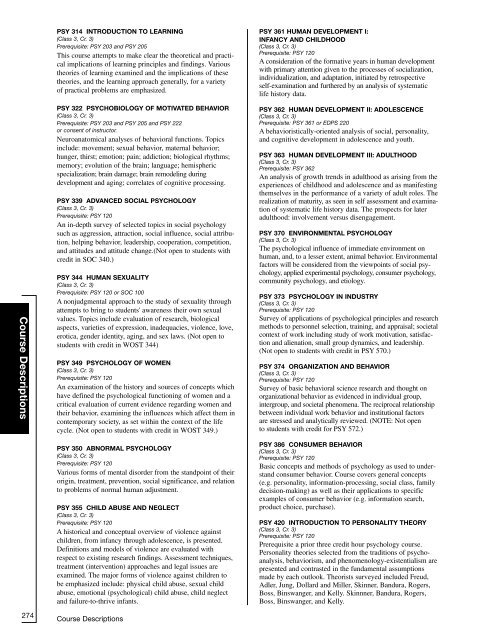ACADEMIC CATALOG - Purdue University Calumet
ACADEMIC CATALOG - Purdue University Calumet
ACADEMIC CATALOG - Purdue University Calumet
You also want an ePaper? Increase the reach of your titles
YUMPU automatically turns print PDFs into web optimized ePapers that Google loves.
PSY 314 INTRODUCTION TO LEARNING<br />
(Class 3, Cr. 3)<br />
Prerequisite: PSY 203 and PSY 205<br />
This course attempts to make clear the theoretical and practical<br />
implications of learning principles and findings. Various<br />
theories of learning examined and the implications of these<br />
theories, and the learning approach generally, for a variety<br />
of practical problems are emphasized.<br />
PSY 361 HUMAN DEVELOPMENT I:<br />
INFANCY AND CHILDHOOD<br />
(Class 3, Cr. 3)<br />
Prerequisite: PSY 120<br />
A consideration of the formative years in human development<br />
with primary attention given to the processes of socialization,<br />
individualization, and adaptation, initiated by retrospective<br />
self-examination and furthered by an analysis of systematic<br />
life history data.<br />
Course Descriptions<br />
PSY 322 PSYCHOBIOLOGY OF MOTIVATED BEHAVIOR<br />
(Class 3, Cr. 3)<br />
Prerequisite: PSY 203 and PSY 205 and PSY 222<br />
or consent of instructor.<br />
Neuroanatomical analyses of behavioral functions. Topics<br />
include: movement; sexual behavior, maternal behavior;<br />
hunger, thirst; emotion; pain; addiction; biological rhythms;<br />
memory; evolution of the brain; language; hemispheric<br />
specialization; brain damage; brain remodeling during<br />
development and aging; correlates of cognitive processing.<br />
PSY 339 ADVANCED SOCIAL PSYCHOLOGY<br />
(Class 3, Cr. 3)<br />
Prerequisite: PSY 120<br />
An in-depth survey of selected topics in social psychology<br />
such as aggression, attraction, social influence, social attribution,<br />
helping behavior, leadership, cooperation, competition,<br />
and attitudes and attitude change.(Not open to students with<br />
credit in SOC 340.)<br />
PSY 344 HUMAN SEXUALITY<br />
(Class 3, Cr. 3)<br />
Prerequisite: PSY 120 or SOC 100<br />
A nonjudgmental approach to the study of sexuality through<br />
attempts to bring to students' awareness their own sexual<br />
values. Topics include evaluation of research, biological<br />
aspects, varieties of expression, inadequacies, violence, love,<br />
erotica, gender identity, aging, and sex laws. (Not open to<br />
students with credit in WOST 344)<br />
PSY 349 PSYCHOLOGY OF WOMEN<br />
(Class 3, Cr. 3)<br />
Prerequisite: PSY 120<br />
An examination of the history and sources of concepts which<br />
have defined the psychological functioning of women and a<br />
critical evaluation of current evidence regarding women and<br />
their behavior, examining the influences which affect them in<br />
contemporary society, as set within the context of the life<br />
cycle. (Not open to students with credit in WOST 349.)<br />
PSY 362 HUMAN DEVELOPMENT II: ADOLESCENCE<br />
(Class 3, Cr. 3)<br />
Prerequisite: PSY 361 or EDPS 220<br />
A behavioristically-oriented analysis of social, personality,<br />
and cognitive development in adolescence and youth.<br />
PSY 363 HUMAN DEVELOPMENT III: ADULTHOOD<br />
(Class 3, Cr. 3)<br />
Prerequisite: PSY 362<br />
An analysis of growth trends in adulthood as arising from the<br />
experiences of childhood and adolescence and as manifesting<br />
themselves in the performance of a variety of adult roles. The<br />
realization of maturity, as seen in self assessment and examination<br />
of systematic life history data. The prospects for later<br />
adulthood: involvement versus disengagement.<br />
PSY 370 ENVIRONMENTAL PSYCHOLOGY<br />
(Class 3, Cr. 3)<br />
The psychological influence of immediate environment on<br />
human, and, to a lesser extent, animal behavior. Environmental<br />
factors will be considered from the viewpoints of social psychology,<br />
applied experimental psychology, consumer psychology,<br />
community psychology, and etiology.<br />
PSY 373 PSYCHOLOGY IN INDUSTRY<br />
(Class 3, Cr. 3)<br />
Prerequisite: PSY 120<br />
Survey of applications of psychological principles and research<br />
methods to personnel selection, training, and appraisal; societal<br />
context of work including study of work motivation, satisfaction<br />
and alienation, small group dynamics, and leadership.<br />
(Not open to students with credit in PSY 570.)<br />
PSY 374 ORGANIZATION AND BEHAVIOR<br />
(Class 3, Cr. 3)<br />
Prerequisite: PSY 120<br />
Survey of basic behavioral science research and thought on<br />
organizational behavior as evidenced in individual group,<br />
intergroup, and societal phenomena. The reciprocal relationship<br />
between individual work behavior and institutional factors<br />
are stressed and analytically reviewed. (NOTE: Not open<br />
to students with credit for PSY 572.)<br />
274<br />
PSY 350 ABNORMAL PSYCHOLOGY<br />
(Class 3, Cr. 3)<br />
Prerequisite: PSY 120<br />
Various forms of mental disorder from the standpoint of their<br />
origin, treatment, prevention, social significance, and relation<br />
to problems of normal human adjustment.<br />
PSY 355 CHILD ABUSE AND NEGLECT<br />
(Class 3, Cr. 3)<br />
Prerequisite: PSY 120<br />
A historical and conceptual overview of violence against<br />
children, from infancy through adolescence, is presented.<br />
Definitions and models of violence are evaluated with<br />
respect to existing research findings. Assessment techniques,<br />
treatment (intervention) approaches and legal issues are<br />
examined. The major forms of violence against children to<br />
be emphasized include: physical child abuse, sexual child<br />
abuse, emotional (psychological) child abuse, child neglect<br />
and failure-to-thrive infants.<br />
Course Descriptions<br />
PSY 386 CONSUMER BEHAVIOR<br />
(Class 3, Cr. 3)<br />
Prerequisite: PSY 120<br />
Basic concepts and methods of psychology as used to understand<br />
consumer behavior. Course covers general concepts<br />
(e.g. personality, information-processing, social class, family<br />
decision-making) as well as their applications to specific<br />
examples of consumer behavior (e.g. information search,<br />
product choice, purchase).<br />
PSY 420 INTRODUCTION TO PERSONALITY THEORY<br />
(Class 3, Cr. 3)<br />
Prerequisite: PSY 120<br />
Prerequisite a prior three credit hour psychology course.<br />
Personality theories selected from the traditions of psychoanalysis,<br />
behaviorism, and phenomenology-existentialism are<br />
presented and contrasted in the fundamental assumptions<br />
made by each outlook. Theorists surveyed included Freud,<br />
Adler, Jung, Dollard and Miller, Skinner, Bandura, Rogers,<br />
Boss, Binswanger, and Kelly. Skinnner, Bandura, Rogers,<br />
Boss, Binswanger, and Kelly.

















